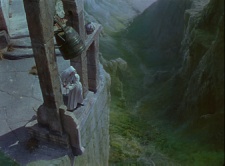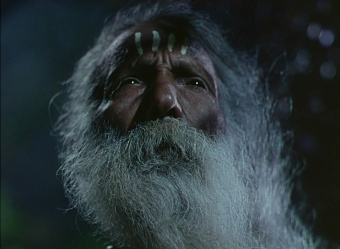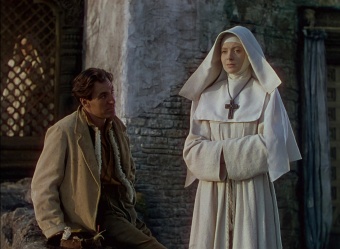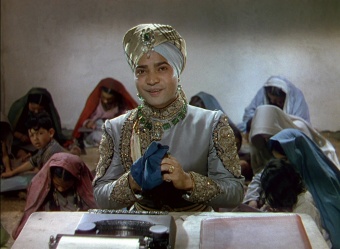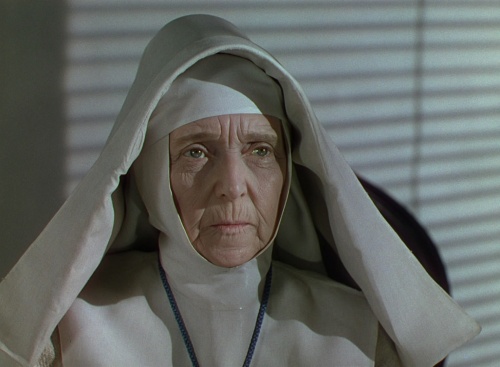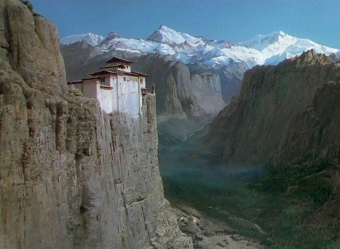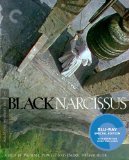| Reviews & Columns |
|
Reviews DVD TV on DVD Blu-ray 4K UHD International DVDs In Theaters Reviews by Studio Video Games Features Collector Series DVDs Easter Egg Database Interviews DVD Talk Radio Feature Articles Columns Anime Talk DVD Savant Horror DVDs The M.O.D. Squad Art House HD Talk Silent DVD
|
DVD Talk Forum |
|
|
| Resources |
|
DVD Price Search Customer Service #'s RCE Info Links |
|
Columns
|
|
|
Black Narcissus
The Criterion Collection // Unrated // July 20, 2010
List Price: $39.95 [Buy now and save at Amazon]
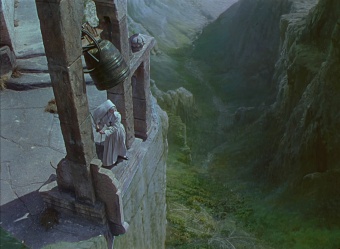 |
| [click on the thumbnail to enlarge] |
Fascinated -- or at least, briefly distracted -- by Christianity and Western civilization, an aging Indian general (Esmond Knight) decides on a whim to convert a crumbling harem into a proper school and dispensary to be staffed by five British nuns. Led by Sister Clodagh (Deborah Kerr), the youngest Sister Superior in their order, they struggle to educate and care for an exotic people wholly disinterested in what Christianity in general and this group of nuns in particular have to offer. Even a fellow countryman (David Farrar) sneers at what he sees as a futile attempt at trying to impose their culture onto a people they fundamentally don't understand. With little experience to speak of, these five nuns are forced to rely purely on their faith to guide them, and even that is sorely tested as they're pitted against their impossible task and the hypnotic thrall of this mountainous, achingly beautiful stretch of India.
Black Narcissus was released just as India was regaining its independence from the British empire, and the timing is fascinating. Colonial arrogance...this false veneer of moral and spiritual superiority...is one of the driving themes of the film. The sisters' goal is to infuse the natives -- who are condescended to and rewarded like a pet dog being taught to roll over -- with the civility of Western culture. They overconfidently set out to transform these strange and exotic people, but the Indians are the same at the end of the movie as they are at the outset; it's the nuns who are profoundly changed and not at all for the better. Faiths are shattered, arrogance turns to despair, long-repressed memories once again bubble to the surface, and, for one of the sisters, a violent madness starts to seize hold. In the majority of films in which the civilized venture out to live among a untainted, unspoiled people, it's treated as a purification for the travelers; the stiff and proper obligations of society give way to something closer to nature...closer to their base emotions. Most movies paint this in the most positive of lights. In Black Narcissus, purity corrupts. Here too the Western protagonists see their repressed emotions simmer again to the surface...begin to feel the heat of unacknowledged desire...bask in the glow of this impossibly
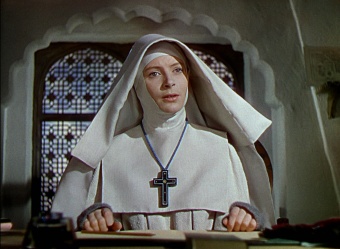 |
| [click on the thumbnail to enlarge] |
This is a film in part about the West's fundamental lack of understanding about the very different cultures they seek to overtake. However, with a couple of notable exceptions, the most prominent Indians are played by British actors buried under mounds of thick brown makeup, and this adds -- perhaps unintentionally -- to the layer of satire prevalent throughout Black Narcissus. The film deftly juggles its more melodramatic moments with a smirklingly satirical sense of humor, with brief flickers of comedy accentuating the drama rather than deflating it.
Black Narcissus is an astonishingly beautiful film, earning two well-deserved Academy Awards for its art direction and cinematography. The entrancing beauty of India isn't merely a backdrop -- it's one of the driving forces of the story and very much a character in its own right, largely to blame for the mental unraveling of the nuns. Black Narcissus does an outstanding job conveying the colossal scope and natural majesty of the Himalayas, and it's all the more impressive that this was accomplished through matte paintings, forced perspective, and an incomparable visual eye, with virtually every last frame of the film shot on a British soundstage. The three-strip Technicolor cinematography by Jack Cardiff continues to mesmerize more than six decades later, and despite the great strength of Black Narcissus' incisive script and outstanding performances, it would have been an almost unrecognizably different film without his talents. The craftsmanship behind Black Narcissus' ambitious visuals is nothing less than staggering. Despite the many years that have passed since the film was first produced, its visual effects work doesn't look dated in the slightest, and the matte paintings hold up marvelously under the scrutiny of this revealing high definition presentation.
Though
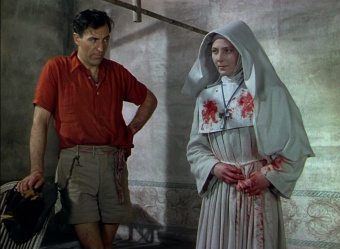 |
| [click on the thumbnail to enlarge] |
Sensual, satirical, suspenseful, and spellbinding, Black Narcissus is an enduring classic that ranks among the most extraordinary works of British cinema. For those who've yet to experience its visual majesty and arresting performances, Black Narcissus is an essential discovery on Blu-ray. Even longtime admirers of the film may feel as if they're watching Black Narcissus for the first time. This film has long been considered one of the most striking works from the golden age of Technicolor, and its incomparable visual eye is all the more dazzling with the world-class restoration showcased here. I cannot even consider assigning Black Narcissus anything less than DVD Talk's highest possible recommendation. DVD Talk Collector Series.
Video
Breathtaking.
Black Narcissus is one of the most startlingly beautiful films I've had the pleasure of experiencing in high definition, and its release on Blu-ray is absolute perfection. The pillarboxed image is richly defined and immaculately detailed, greatly belying the age of this sixty-three year old film. The texture and definition of Black Narcissus' original photography remain very much intact, showing no sign of being smeared away by excessive digital noise reduction or invasive edge enhancement. The image isn't marred by any wear or speckling of note, and the thin veil of film grain visible throughout is tightly rendered and wholly unintrusive. The lush, vibrant hues of the Technicolor cinematography look extraordinary on Blu-ray, and the image is bolstered by remarkably robust blacks and the wonderfully smooth gradients of Jack Cardiff's masterful lighting. The only flaw of any sort is some slight wavering in color saturation in the earliest moments of the film, but this quickly stabilizes and is much too light to never be distracting. As dazzled as I so frequently have been by the presentations of classic Technicolor films on Blu-ray, Black Narcissus ranks among the most extraordinary of them all.
Criterion's Blu-ray release of Black Narcissus has been culled from the same master that ITV used for the British high definition release in 2008. I had no complaints or concerns whatsoever about the British Blu-ray disc, and the same holds true for the film's expectedly wonderful treatment by Criterion. The technical specifications of the Criterion release certainly outclass what ITV issued two years ago. This new AVC encode has been lavished with a considerably higher bitrate than the VC-1 presentation on ITV's single layer Blu-ray disc; coupled with its uncompressed audio, the Criterion encode is nearly twice the size. This additional headroom doesn't make an appreciable difference in the quality of the presentation, however. Direct comparisons reveal the slightest bit of additional texture on the Criterion disc, but honestly, I'd be hard-pressed to distinguish one of these Blu-ray discs from the other. A sample comparison between the two is provided below.
Black Narcissus' AVC encode spans both layers of its BD-50 disc, and the image is pillarboxed to preserve the film's original aspect ratio of 1.37:1.
Audio
While the earlier ITV Blu-ray disc was limited to a Dolby Digital 2.0 monaural soundtrack, encoded at a bitrate of 640kbps, Criterion's release of Black Narcissus features uncompressed PCM audio. Despite the upgrade to a proper lossless soundtrack, Black Narcissus' audio is still unable to approach the dizzying heights of its high definition visuals, restrained by the age of the recording and its limited dynamic range. Though some mild strain is evident, and the mix isn't especially full-bodied, Black Narcissus' dialogue remains reasonably crisp and clear. The terrific score by Brian Easdale -- who would go on to win an Academy Award for his startling work in his subsequent collaboration with Powell and Pressburger, The Red Shoes -- is reproduced wonderfully, and the musical selections and sound effects are balanced deftly enough in the mix that the dialogue is never once overwhelmed. Black Narcissus boasts an accomplished sound design, and the limitations of the source don't detract from its greatest strengths, such as the persistent howl of the wind that's essentially a character in its own right. The soundtrack is free of any intrusive pops or background noise, and the faint hiss that's present is easily ignored. Its monaural audio may not be nearly as remarkable as this Blu-ray disc's visual presentation, no, but this is a more than respectable effort by Criterion.
Though not listed as an option on the disc's menu, English captions for the deaf and hard of hearing are also available.
Extras
Black Narcissus offers a healthy selection of extras, though its archival approach leaves the same observations and anecdotes reiterated repeatedly throughout the disc.
- Audio Commentary: This
Blu-ray disc carries over the audio commentary that director/producer Michael Powell recorded with his friend and great admirer Martin Scorsese in 1988. It's unfortunate that this track was pieced together from two separate recording sessions; had the commentary been a proper conversation between Powell and Scorsese, it almost certainly would've been much more engaging. There's a disappointing amount of dead air as both participants seem to spend far more time quietly watching Black Narcissus than they do discussing it. There certainly are some intriguing notes -- Powell drawing quite a bit of inspiration from the work of Walt Disney, comparing and contrasting the novel with the film at greater length than any of the other extras, Black Narcissus' emphasis on direct cuts influencing the editing of Scorsese's The King of Comedy, and the Catholic Church frowning on the use of nuns in such a sensual film -- but the discussion is so sporadic that the commentary is difficult to recommend to those with a casual interest.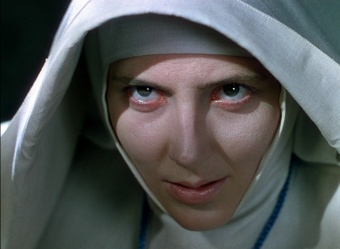
[click on the thumbnail to enlarge]
- Bertrand Tavernier Introduction (9 min.; SD): The French filmmaker offered this introduction for the 2006 DVD release of Black Narcissus in his homeland. Conducted, it follows, in French, Tavernier touches on Powell's use of 'composed cinema' in the film's climax, discusses the cast in detail, and explores Black Narcissus' visual splendor and erotic bent.
- The Audacious Adventurer (17 min.; SD): Tavernier returns to discuss Black Narcissus at greater length, beginning with an exploration of the state of British cinema in the years after the war...an approach none of the other extras on this disc choose to take. Another distinctive comment is the constant sense of movement throughout the film, one that's largely owed to the unrelenting wind. Among the other standout remarks are Powell's casting of Deborah Kerr as the Sister Superior despite her tender age, Lawrence Olivier's incendiary response to the teenaged Jean Simmons -- his Ophelia! -- playing such an erotic role, and Black Narcissus marking the Archers' first move into adapting an existing work.
- Profile of Black Narcissus (25 min.; SD): The first of Black Narcissus' two half-hour retrospectives is an upbeat and charming look into the production of the film. Director of photography Jack Cardiff, assistant editor Noreen Ackland, film historian Ian Christie, actress Kathleen Byron, and camera operator Christopher Challis drive this featurette through a series of interviews, with quite a number of excerpts from the film interspersed throughout. Among the topics addressed here are the complementary yin-and-yang relationship between Powell and Pressburger, the elaborate and thoroughly convincing reproduction of India within Britain's Pinewood Studios, composer Brian Easdale's infusing of a somewhat traditional symphonic 1940s film score with Eastern inflections, and the critical and commercial response to Black Narcissus as well as its enduring influence in the many years since. Even if this retrospective isn't particularly scholarly, the charm of its interviewees certainly hasn't dulled over these many decades, and they discuss how the actresses playing the nuns had to wear flesh-colored makeup over their lips because the natural color looked too much like ruby-red lipstick on camera, one on-set clash between the film's passive-aggressive director and Kathleen Byron, the rising star of Deborah Kerr, and the casting of the nearly-blind Esmond Knight as the Old General.
- Painting with Light (26 min.; SD): This second featurette covers much the same ground that "Profile..." does, and some of the same interview footage is even shared between them. As suggested by the featurette's title, though, its emphasis is more heavily placed on Jack Cardiff. The legendary cinematographer guides viewers through the innards of a Technicolor camera, the demands of the three-strip Technicolor process on production, and how his photography was intensely influenced by the likes of Rembrandt and Vermeer. Martin Scorsese and his longtime editor Thelma Schoonmaker also briefly contribute their thoughts.
- Trailer (3 min.; HD): The last of the extras is a weathered but still high definition presentation of Black Narcissus' theatrical trailer.
Accompanying Black Narcissus is a detailed set of liner notes penned by Kent Jones.
The Final Word
Still endlessly evocative and startlingly beautiful more than sixty years after it first roared into theaters, Black Narcissus ranks among the greatest and most enduring works of British cinema. This extraordinary film benefits further from a respectable uncompressed soundtrack and a reasonably strong selection of extras, but it's Black Narcissus' breathtaking high definition presentation that places this Blu-ray disc in a class all its own. Over the past few years, I've had the pleasure of watching some 1,300 films in high definition, and staggeringly large though that number may be, this presentation of Black Narcissus outclasses nearly every last one of them. It's heartening to see such a remarkable work of art lavished with an equally extraordinary presentation on Blu-ray. DVD Talk Collector Series.
Additional Screenshots
|
| Popular Reviews |
| Sponsored Links |
|
|
| Sponsored Links |
|
|
| Release List | Reviews | Shop | Newsletter | Forum | DVD Giveaways | Blu-Ray | Advertise |
|
Copyright 2024 DVDTalk.com All Rights Reserved. Legal Info, Privacy Policy, Terms of Use,
Manage Preferences,
Your Privacy Choices | |||||||










